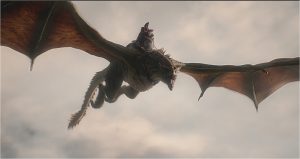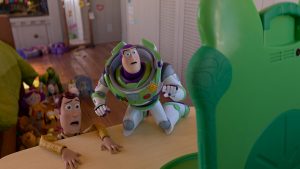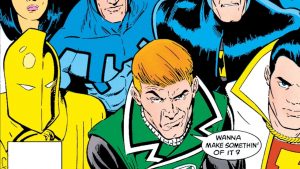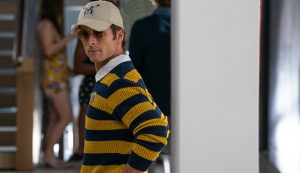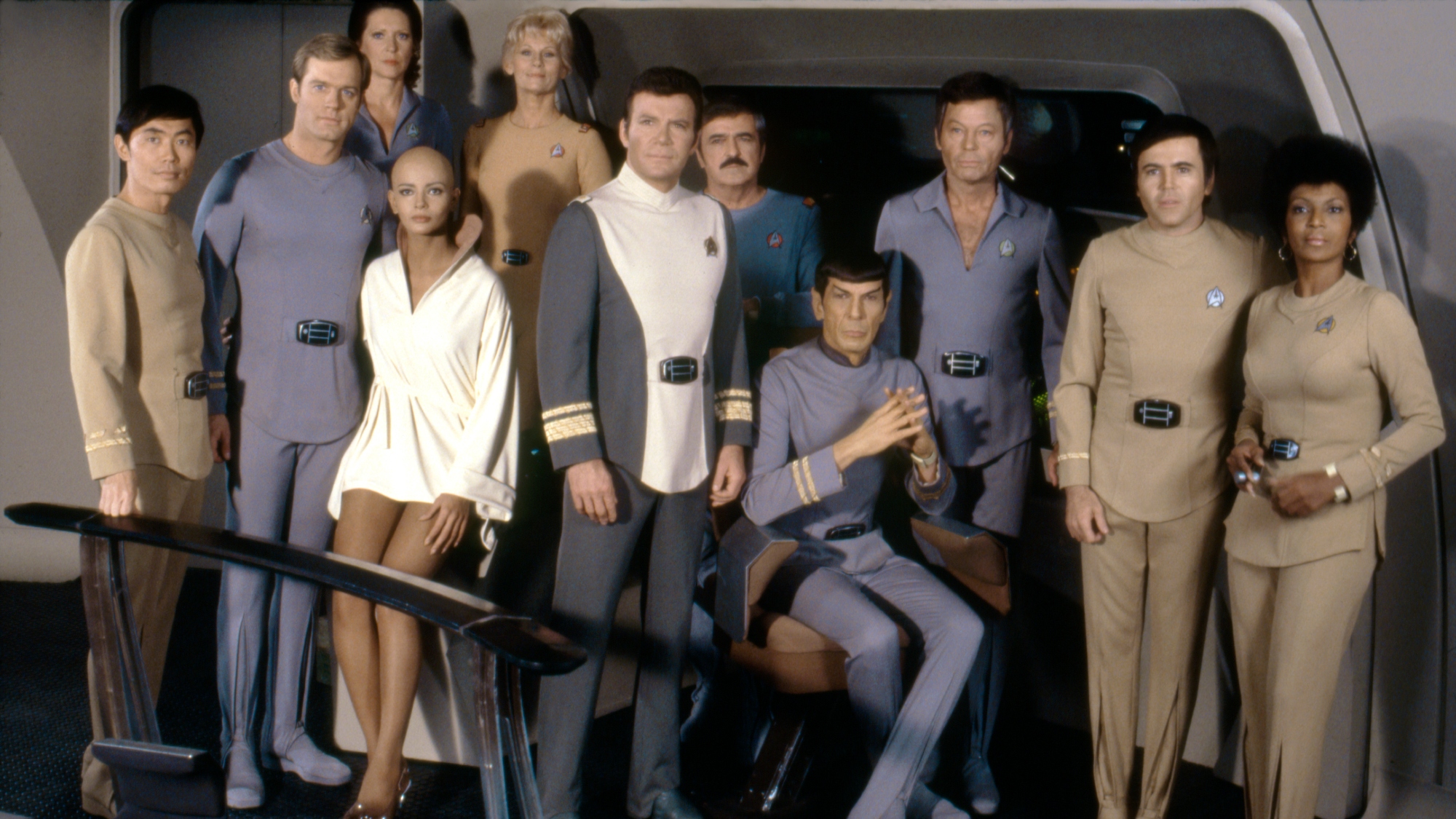
Star Trek: The Motion Picture is an awesome movie. No, it’s not as whiz-bang as its immediate successor Star Trek II: The Wrath of Khan, nor as spectacular as the 2009 reboot film Star Trek. But what word can better describe a movie that spends so much time on loving shots of all things Trek—the crew, the starbases, and especially the USS Enterprise. The movie strives to evoke a sense of awe.
But if there’s one aspect of The Motion Picture that doesn’t get enough recognition, it’s the redesigned Starfleet uniforms. The Motion Picture introduces a full new set of costumes, eschewing the bold colors of The Original Series for soft cotton earth tones. But outside of a couple winks on Lower Decks and the J.J. Abrams movies, the uniforms were promptly scrapped, tossed aside for the glorious red naval uniforms introduced in Wrath of Khan or variations of the jumpsuits in The Next Generation. To many fans, the “pajama” uniforms are one of the more embarrassing moments in the franchise and best left in 1979.
But odd as they are, the costumes in The Motion Picture capture that movie’s relaxed, contemplative tone, which has only grown more important as the franchise grows more action oriented.
Boldly Gone Beyond TV
The premise of The Motion Picture suggests urgency.
Written by Harold Livingston from a story by Alan Dean Foster and directed by Robert Wise, TMP opens with the destructive V’Ger probe headed toward Earth, giving now-Admiral Kirk the excuse he needs to once again assume command of the Enterprise, returning to the bridge for the first time since the completion of his ship’s five-year mission. Kirk’s brash action upsets the Enterprise’s new captain, Willard Decker, who gets field demoted to Commander and made the ship’s XO. Then, a transporter accident, one of the more horrific moments in Star Trek history, leaves an opening for a new Science Officer, which brings the long-estranged Spock back to the ship.
Despite the movie’s high stakes, The Motion Picture doesn’t do anything quickly, which has earned it the uncharitable nickname “Star Trek: The Motionless Picture.” But Star Trek has always been more about contemplation than action, but the long shadow of 2001: A Space Odyssey gave creator Gene Roddenberry and director Wise permission to take things slowly. Unlike Star Wars, whose success allowed the project to shift from sequel series Star Trek: Phase II to a proper film, TMP had little interest in dog fights and swashbuckling. “We’ll take no provocative action,” Kirk tells Decker in one key moment, succinctly capturing the movie’s tone.
Roddenberry and the producers took advantage of the shift to the big screen to redesign and even correct aspects of the series limited by the initial TV show budget. The Motion Picture marks the debut of what many consider the ideal Klingon look, with their pronounced head-ridges and red-hued ships. The Enterprise gets completely revised, doing away with the neon-lit industrial design of the show, for something closer to the carpeted beige of the Enterprise-D.
But the most notable, and controversial aspect, remains the costume design.
A Languid Look
“Throwaway clothing.” That’s how Gene Roddenberry saw the future of fashion, according to the book he co-wrote with assistant Susan Sackett, The Making of Star Trek: The Motion Picture. “More science fact than science fiction” is how costume designer Robert Fletcher put it, reflecting on the film for a 1980 issue of Fantastic Films.
“Ugly, form-fitting, pastel-colored, one-piece jumpsuits” is how William Shatner described them in Star Trek: Movie Memories. “[I]t was virtually impossible for any male member of our cast to sit down without seriously endangering his ability to procreate,” he adds. “All day long, our set was peppered with the pitiful high-pitched yelps and wailings of castmates discovering this particular design flaw for the very first time.”
As this sampling suggests, the TMP redesign costumes were controversial at the time. The problem began when TOS designer William Ware Theiss couldn’t return for the film, and the producers hired theater veteran Fletcher instead. Fletcher’s ambitions matched those of Roddenberry, and the two egged one another on in designing futuristic clothing, with no regard for the actors’ practical concerns. Most irritating were the shoes sown into the trousers, which made dressing and undressing a complicated ordeal. So hated were the TMP costumes that the cast refused to sign on to Star Trek II without assurances that the jumpsuits would not be reused.
Difficult as they actually were, Roddenberry and Fletcher’s ideas still have value. Even though cast members such as Nichelle Nichols and Grace Lee Whitney quite liked the miniskirts women wore in TOS, it’s hard to deny that they felt retrograde by the late 70s. Furthermore, by moving assignment colors from the red, gold, and blue tunics worn in TOS to patches and insignias, the movie emphasized the fundamentally egalitarian nature of Starfleet. Sure, Kirk can and does pull rank on Decker (look up the actor’s wiki if you feel bad for ol’ Bill Decker and you’ll think he got off easy), but the similar colors and tones of the uniforms suggest that anyone has the ability to rise in Starfleet.
But the most important aspect of the costumes is how they move away from the rigid military style implied in TOS and accentuated from Wrath of Khan onward. Despite his extended time working with the LA police department, Rodenberry always wanted to downplay the military or law and order aspects of Starfleet. Yet, even when wearing costumes that resembled regular sailors’ sweaters, Kirk and crew looked like naval officers.
By changing into soft (looking) materials and colors, the costumes erase all sense or rigidity and action. Even the security detail, who drape ridiculous looking helmets and chest plates over their tan duds, don’t seem ready to leap into the fray. Instead, the costumes look best suited for contemplation, for rumination, for taking things slowly. And if there’s one thing that The Motion Picture does best, it’s take things slowly.
Need proof? Check out McCoy’s arrival on the ship, complete with shaggy beard and a glistening medallion nestled amidst a rug of chest hair. Bones wasn’t happy to come aboard, but he fully embodied the free-wheeling attitude of TMP‘s costumes, ready to hang loose instead of man battle stations.
It’s not hard to see why the franchise has stuck with the naval uniforms that director Nicholas Meyer insisted upon for Wrath of Khan, much to Roddenberry’s chagrin. The crew looks regal in the outfit, befitting characters who have spent years traveling across deep space.
But as audience tastes and the demands of modern franchise building leave the slow sci-fi of the ’60s and ’70s behind, TMP‘s languid costumes become even more important. After all, if the true undiscovered country is the human mind, then what better way to get there than sitting down in some comfy clothes. Just be careful how you sit, or you’ll end up with a very different sense of awe.
The post Star Trek: The Motion Picture’s Bizarre Starfleet Costumes Make More Sense Than You Think appeared first on Den of Geek.





